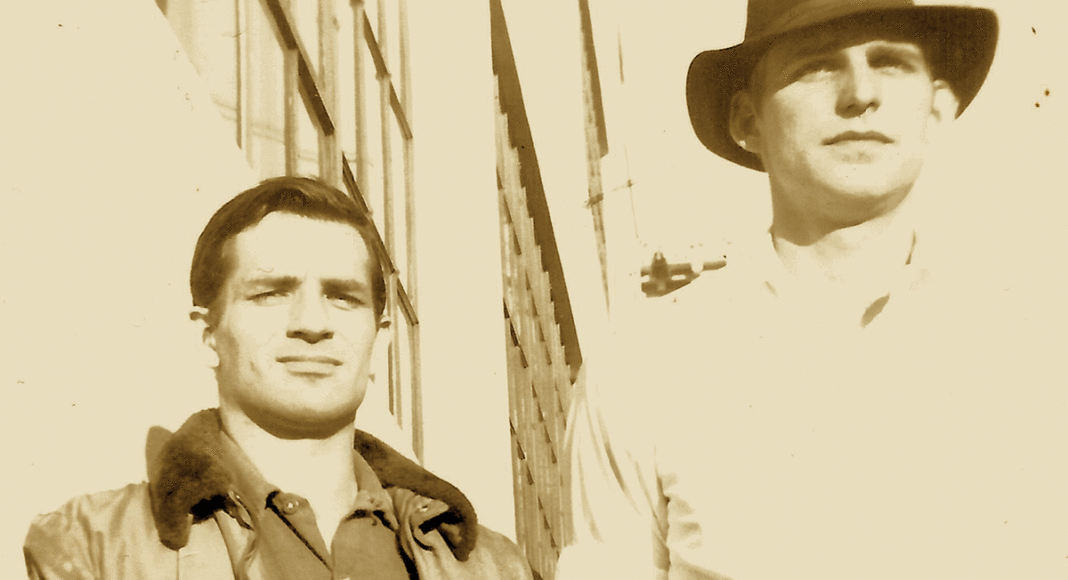He was probably the least-likely person on earth to be taken for a seminal figure in the annals of the Beat literary movement, but lanky, easy-going, sweet-smiling Al Hinkle was certainly a critical lynchpin in that history.
Raised in pool-hall Denver with his childhood pal, the iconic Beat figure (and writer) Neal Cassady, it was the recently married Hinkle (along with his bride, the former Helen Argee) who jumped in Cassady’s brand new, maroon-and-silver Hudson sedan for a crisscross continental journey that eventually included an unpublished writer named Jack Kerouac; one of Cassady’s many girlfriends, Luanne Henderson; and an assortment of other hitchhikers and hangers-on who were all immortalized in Kerouac’s seminal Beat novel, On the Road (1957).
It was Hinkle who headed west to California, finally settling in the Santa Clara Valley, where he took a job on the Southern Pacific Railroad initially out of Watsonville. Cassady, down and out in Denver with a pile of romantic woes bearing down on him, along with both Kerouac and Allen Ginsburg, the poet laureate of the Beat movement, joined the rag-tag assemblage of novelists and poets on the West Coast. Both Cassady and Kerouac (briefly) also worked with Hinkle on the railroad.
As a result, Hinkle was the steady gravitational anchor (with a home and regular paycheck) who augured the San Francisco literary Renaissance before its 1955 apotheosis with the reading of Ginsberg’s epic poem Howl—in which Cassady was acknowledged as the “secret hero” of Ginsberg’s work.
While Kerouac and Cassady flamed out early—Cassady at the age of 43 in 1968; and Kerouac, at 47, the following year—Hinkle, who died two weeks ago from heart failure at the age of 92, held steady, and outlived his two more famous pals by a full half-century. A few years ago, he put together a booklet (based on an interview with Stephen D. Edington and some other writings) entitled Last Man Standing, in which he consolidated some of his groundbreaking memories.
Born in Florida in 1926 (his father was playing minor league baseball), Hinkle and his family returned to his father’s hometown of Denver when he was two. Hinkle’s mother died when he was 8, leaving him free to roam the Depression-era streets with his buddies and siblings. It was in the late 1930s that he first met Neal Cassady at a YMCA recreation hall.
Five years later, Hinkle, by then a lanky 6-foot-6, joined the Merchant Marines and headed off to the Pacific. He served two years before returning to Denver at the end of World War II. It was then that he re-connected with Cassady—six months his junior—in the pool halls and beer joints of Denver.
One night in the early 1990s, Al, Helen and I stayed up until nearly dawn, drinking coffee, smoking cigarettes and recounting stories of their earlier days when Kerouac, Cassady and Ginsberg were part of their daily social milieu. Both Al and Helen felt it was important to normalize much of that history. Indeed, Helen acknowledged that she hadn’t read On the Road, in which she and her husband were featured as Galatea and Big Ed Dunkel, until the 1980s.
It was in March of 1947 that another Denver chum of Hinkle’s named Bill Tomson introduced the irrepressible Cassady to a beautiful Bennington graduate named Carolyn Robinson, then pursuing a master’s degree in theater arts at Denver University. After more than a few false starts, they eventually married.
Both the Hinkles and Cassadys would eventually settle into new tract homes in the burgeoning Santa Clara Valley, with Al and Neal holding down steady jobs with Southern Pacific. The Hinkles had two children—Mark and Dawn—while the Cassadys had three—Cathy, Jami and John Allen (the latter named after Kerouac and Ginsberg). “They were like family,” Al’s daughter Dawn Davis recently told me. “We were always very close.”
A NEW BEAT
I visited with Hinkle last winter, and although not as physically spry as he once was, his mind was still sharp. He was also willing to go a little farther with some of his stories than he had a quarter-century earlier. He was always very fond of Kerouac, and, when we first met, spoke in only glowing terms about the famous novelist. At our final meeting, he acknowledged to me that Jack’s alcohol problem posed some real difficulties for their friendship and that Kerouac was “a mean drunk.” That was one of the first times I ever heard him be critical of anyone.
Hinkle received a degree from San Francisco State and studied for his master’s degree at Stanford (which he never quite finished). He ran unsuccessfully for Congress on the Libertarian Party ticket in 1980, and then retired in 1987 from Southern Pacific—with more than 40 years on the job.
After Helen died in 1994, Hinkle remarried briefly, and kept up a daily routine as friend, father and grandfather. He enjoyed cards and engaging in long conversations.
According to his daughter Dawn, there will be no memorial service for Hinkle, at his request. “Dad didn’t want anyone to fuss over him,” she said. “That’s just who he was.”















I just wished you’d get your facts straight – the whole article reaks of misinformation, I regret to say.